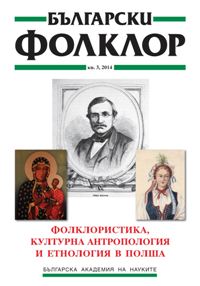От придворна девойка до действена феминистка. Антропологични измерения на Богородичния култ
From Our Lady of the Manor House to Feminist Agency. Anthropological Dimensions of Marian Devotion
Author(s): Magdalena ZowczakSubject(s): Anthropology
Published by: Институт за етнология и фолклористика с Етнографски музей при БАН
Keywords: Marian devotion; religious culture; sensualism
Summary/Abstract: Marian devotion, a self-evident Christian phenomenon in Poland, is a historically entrenched theme, which offers a wide scope of issues and thus makes a rewarding topic for anthropological studies on religious culture. Its symbolic patterns have shaped throughout centuries commonsense thinking and emotions and have influenced social relations.As a result of the postmodern turn and the liberalization of culture, Marian devotion has become during the last two decades a favorite subject of deconstruction from the perspective of engaged anthropology and particularly feminist. Its sociocentrism and valorization of the body usually entails overlooking the religious perspective or changing its meaning. I will discuss selected examples of discourses present in Polish studies on religious culture from the perspective of meanings that have been imposed on the term “Marian devotion” since the 1930s and I will confront it with my own interpretation of this phenomenon. I will particularly concentrate on the term “sensualism”, which is regarded as a specific feature of the Catholic Marian devotion. In the feminist discourse it becomes displaced: from being the subject of analysis it becomes the feature of discourse, which develops around a performative political project. The semantic aspect of analysis, on which studies regarding symbolic culture had previously concentrated, becomes seriously limited. I will follow the radical turn in interpretation – from the Marian devotion perceived in terms of “magic” to its instrumental use in the construction of the social relations model, from interpretations of the Holy Mother as a “kindly lady from the manor house” to a “spiritually empowered” Feminist. I will show how the construction of the social identity of the authors corresponds with the phenomenon of Marian devotion in the discussed writings.
Journal: Български фолклор
- Issue Year: XL/2014
- Issue No: 3
- Page Range: 238-261
- Page Count: 24
- Language: Bulgarian
- Content File-PDF

